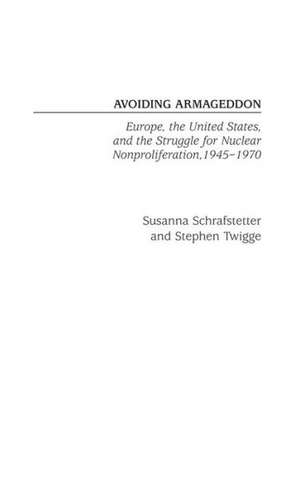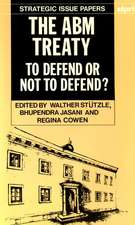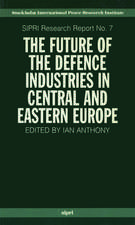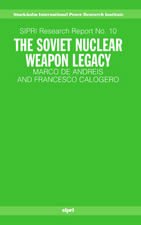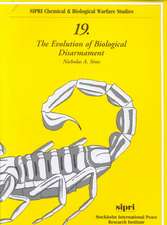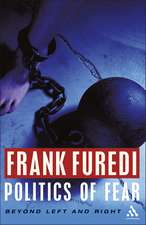Avoiding Armageddon: Europe, the United States, and the Struggle for Nuclear Non-Proliferation, 1945-1970
Autor Susanna Schrafstetter, Stephen Twiggeen Limba Engleză Hardback – 29 apr 2004 – vârsta până la 17 ani
Preț: 437.84 lei
Preț vechi: 707.79 lei
-38% Nou
Puncte Express: 657
Preț estimativ în valută:
83.78€ • 91.29$ • 70.60£
83.78€ • 91.29$ • 70.60£
Carte tipărită la comandă
Livrare economică 23 aprilie-07 mai
Preluare comenzi: 021 569.72.76
Specificații
ISBN-13: 9780275975999
ISBN-10: 0275975991
Pagini: 256
Dimensiuni: 156 x 235 x 23 mm
Greutate: 0.52 kg
Ediția:New.
Editura: Bloomsbury Publishing
Colecția Praeger
Locul publicării:New York, United States
ISBN-10: 0275975991
Pagini: 256
Dimensiuni: 156 x 235 x 23 mm
Greutate: 0.52 kg
Ediția:New.
Editura: Bloomsbury Publishing
Colecția Praeger
Locul publicării:New York, United States
Notă biografică
Susanna Schrafstetter is a L=lecturer in history at the University of Glamorgan, Wales. She earned her PhD in 1998 from the University of Munich, Germany, and is currently teaching as a Visiting Assistant Professor at the University of Nebraska, Lincoln. Her research interests include nuclear history, especially non-proliferation policy, Anglo-German relations, and the Cold War. She has published articles in Contemporary European History, Diplomacy & Statecraft and Journal of Strategic Studies.Stephen Twigge is an Honorary Research Fellow in the Department of Science and Technology Studies, University College, London. He was formerly a Research Associate in the Department of International Politics, University of Wales, Aberystwyth. He has written widely in the field of nuclear history and international relations and is the author (with Len Scott) of Planning Armageddon: Britain, the United States and the Command of Western Nuclear Forces, 1945-1964.
Cuprins
IntroductionThe International Option: UN Control of Nuclear Weapons, 1945-1948The Commercial Option: Nuclear Warfare? Atoms for Peace and the UN Disarmament Commission, 1948-1958The Moral Option: Western Europe and the Test Ban Treaty Negotiations, 1954-1963The Multilateral Option: Alliance Cohesion and Collective Nuclear Forces, 1957-1965The Legal Options: Negotiations for the Nuclear Non Proliferation Treaty, 1961-1969ConclusionBibliography
Recenzii
As Americans and Europeans debate global priorities and nuclear terror, this studied history of trans-Atlantic nuclear relations takes on added import. Schrafstetter and Twigge present a sophisticated and readable portrayal of the varied motives of the major powers, the realities of power and influence, and occasionally principled policymaking. . . . Recommended. Lower-division undergraduates and beyond.
[A] mind expanding experience. Susanna Schrafstetter and Stephen Twigge have performed a needed service in analyzing the contributions made by Great Britian, France, and the Federal Republic of Germany (FRG) in the struggle to control the bomb. . . . Avoiding Armageddon masterfully transforms the Europeans from merely bit players lurking in the wings of the Cold War to the center stage of world politics.
[A] mind expanding experience. Susanna Schrafstetter and Stephen Twigge have performed a needed service in analyzing the contributions made by Great Britian, France, and the Federal Republic of Germany (FRG) in the struggle to control the bomb. . . . Avoiding Armageddon masterfully transforms the Europeans from merely bit players lurking in the wings of the Cold War to the center stage of world politics.
